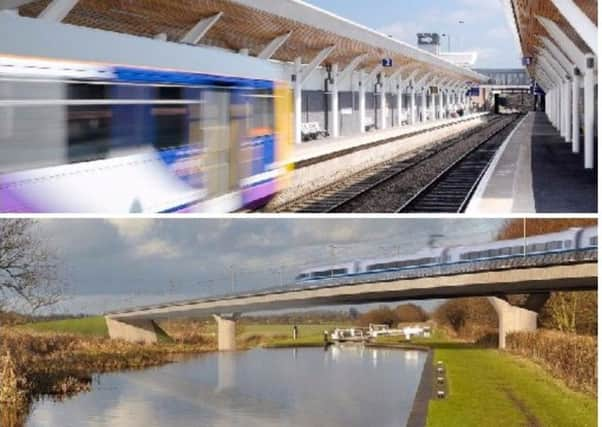Wasted millions: Watchdog hits out at lack of spending controls on Yorkshire transport schemes


The chair of the Public Accounts Committee issued the warning as it published two damning reports on the running of the Sheffield to Rotherham tram-train scheme and the government-owned High Speed 2 Limited company.
It came as the North’s strategic transport body revealed the first details of its vision to revolutionise travel across the region, which will see up to £2.3bn spent a year on average for the next three decades.
Advertisement
Hide AdAdvertisement
Hide AdIn its report on HS2 Ltd, responsible for running the high speed line which will reach Leeds by 2033 and stop in Sheffield city centre, the committee described unauthorised payments to HS2 staff worth £1.76 million as a “shocking waste of taxpayers’ money”. It expressed concern that the former boss of HS2 Ltd, Simon Kirby, has “not been held to account for his actions”.
The UK’s first tram-train scheme was describe as an example of “how not to” manage a rail project. It said “unrealistic costings” went unchallenged and doubts remain over whether the pilot will improve the delivery of similar programmes.
Tram-trains were due to begin running on street tracks and railway lines between Sheffield and Rotherham in December 2015, but the work is at least two-and-a-half years behind schedule.
Advertisement
Hide AdAdvertisement
Hide AdIt is intended to be a pilot scheme to test the concept for possible wider roll-out across the UK to reinvigorate under-used rail lines, improve access to city centres and release capacity at mainline stations.
Modification of the national rail network is part-funded by the Government and managed by Network Rail. The latter’s work to modify the rail network in South Yorkshire will cost £75.1 million compared with an initial estimate of £15 million when the scheme was first approved in 2012.
The PAC compared the project to Network Rail’s delayed and over-budget electrification of the Great Western rail line.
The report also revealed that £5m spent on changes to overhead powerlines along the route was wasted when Transport Secretary Chris Grayling announced that the electrification of the Midland Mainline to the north of Kettering had been cancelled.
Advertisement
Hide AdAdvertisement
Hide AdIt recommended the government-owned company improve its ability to produce realistic cost estimates and ensure it makes appropriate allowances for risk and uncertainty.
Committee chair Meg Hiller said: “Not for the first time, we heard evidence intended to reassure Parliament and the public that lessons learned on this project will ensure the failings identified will not arise again.
“We will be expecting Government to back this up with a meaningful review of the way it manages such projects, from calculating cost estimates through to transparently evaluating results.
“Actions speak louder than words and on behalf of taxpayers we will, if necessary, recall witnesses responsible for current and future projects and hold them to account for their performance.”
Advertisement
Hide AdAdvertisement
Hide AdThe Department for Transport described the tram-train scheme as “a ground breaking pilot project that will transform services for passengers between Sheffield and Rotherham” and a “blueprint for rolling out tram train technology”.
A spokesman said: “There will be always uncertainty when developing new technology and we have been clear about our disappointment at the delay and cost of this project.
“But Network Rail now have costs under control and this scheme - the first of its kind - has huge potential to wider transform services for passengers across the country.”
In its report on HS2 Ltd, the committee urged the Department for Transport (DfT) and the company to address the issues which led to the enhanced redundancy payouts “as a matter of urgency”.
Advertisement
Hide AdAdvertisement
Hide AdThe PAC heard evidence Mr Kirby failed to act on DfT orders that the redundancy scheme should be restricted to statutory levels.
In a hard-hitting report it stated that the payments proceeded because of “weak internal processes at HS2 Ltd” which stopped decision-making and scrutiny bodies from receiving accurate information.
The relationship between the DfT and the company “was not robust enough to prevent this”, the committee added.
It called on both organisations to “carefully consider whether any further action can now be taken” against Mr Kirby, who left his role as chief executive in December 2016 and is now chief operating officer at aerospace giant Rolls-Royce.
He has previously denied “any allegation of wrongdoing”.
Advertisement
Hide AdAdvertisement
Hide AdLabour’s shadow transport secretary Andy McDonald accused Transport Secretary Chris Grayling of having a “cavalier attitude towards the nation’s finances” and called on him to “take responsibility and spell out what he will do to prevent any more public money being squandered”.
A DFT spokesman said: “We have made clear to HS2 Ltd in the strongest terms that we expect them to always meet their obligations and responsibilities to the taxpayer. The progress of HS2 should not come at the expense of proper control over public money.
“HS2 Ltd’s chairman Sir David Higgins is confident that the company, under new chief executive Mark Thurston, will not let this happen again.
“We have accepted the recommendations of the GIAA report in full. HS2 Ltd and DfT are taking serious and proportionate action to implement all of the report’s recommendations by early 2018.”